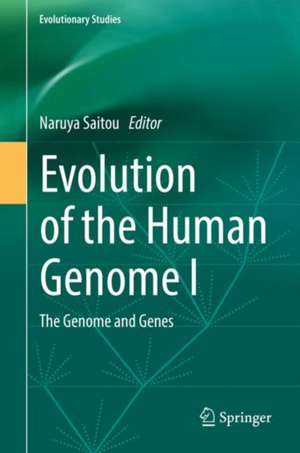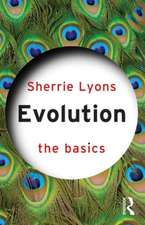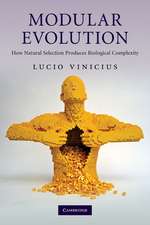Evolution of the Human Genome I: The Genome and Genes: Evolutionary Studies
Editat de Naruya Saitouen Limba Engleză Hardback – 22 feb 2018
| Toate formatele și edițiile | Preț | Express |
|---|---|---|
| Paperback (1) | 1037.59 lei 38-45 zile | |
| Springer – 7 iun 2019 | 1037.59 lei 38-45 zile | |
| Hardback (1) | 1049.38 lei 38-45 zile | |
| Springer – 22 feb 2018 | 1049.38 lei 38-45 zile |
Preț: 1049.38 lei
Preț vechi: 1380.76 lei
-24% Nou
Puncte Express: 1574
Preț estimativ în valută:
200.79€ • 209.65$ • 166.19£
200.79€ • 209.65$ • 166.19£
Carte tipărită la comandă
Livrare economică 31 martie-07 aprilie
Preluare comenzi: 021 569.72.76
Specificații
ISBN-13: 9784431566014
ISBN-10: 4431566015
Pagini: 301
Ilustrații: VIII, 305 p. 74 illus., 39 illus. in color.
Dimensiuni: 155 x 235 x 21 mm
Greutate: 0.64 kg
Ediția:1st ed. 2017
Editura: Springer
Colecția Springer
Seria Evolutionary Studies
Locul publicării:Tokyo, Japan
ISBN-10: 4431566015
Pagini: 301
Ilustrații: VIII, 305 p. 74 illus., 39 illus. in color.
Dimensiuni: 155 x 235 x 21 mm
Greutate: 0.64 kg
Ediția:1st ed. 2017
Editura: Springer
Colecția Springer
Seria Evolutionary Studies
Locul publicării:Tokyo, Japan
Cuprins
Preface.- Part I: Overview of the Human Genome.- Chapter 1: Human evolution and human genome at a glance.- Chapter 2: Rubbish DNA: The functionless fraction of the human genome.- Chapter 3: GC content heterogeneity.- Chapter 4: Protein-coding and non-coding RNA genes.- Chapter 5: Duplicated genes.- Chapter 6: Recombination.-Chapter 7: CNVs and microsatellite DNA polymorphism.-Part II: The Human Genome Viewed through Genes.-Chapter 8: Genes on X and Y chromosomes.- Chapter 9: Human Leukocyte Antigen (HLA) region in human population studies.-Chapter 10: Evolution of genes for color vision and the chemical senses in primates.-Chapter 11: Global landscapes of human phenotypic variation in inherited traits.- Chapter 12: Transcription factor genes.- Chapter 13: Genetics of diabetes: are they thrifty genotype?.- Chapter 14: Disease-related genes from population genetic aspect and their functional significance.- Chapter 15: Microbe genomes associated with human body.-Index.
Recenzii
“Saitou’s Evolution of the Human Genome I offers a strikingly comprehensive introduction to both the evolutionary history of the human genome and molecular and computational methods for studying it. … it will serve as useful background reading for advanced undergraduates and beginning graduate students venturing for the first time into this fast-moving field. Summing Up: Recommended.” (D. P. Genereux, Choice, Vol. 56 (2), October, 2018)
Notă biografică
Naruya Saitou, National Institute of Genetics, Mishima, Japan
Textul de pe ultima copertă
This book reviews the human genome from an evolutionary perspective. No such book has ever been published before, although there are many books on human genomes. There are two parts in this book: Overview of the Human Genome (Part I) and The Human Genome Viewed through Genes (Part II). In Part I, after a brief review of human evolution and the human genome (by Naruya Saitou), chapters on rubbish or junk DNA (by Dan Graur), GC content heterogeneity (by Satoshi Oota), protein coding and RNA coding genes (by Tadashi Imanishi), duplicated genes (by Takashi Kitano), recombinations (by Montanucci and Bertranpetit), and copy number variations including microsatellites (by Naoko Takezaki) are discussed. Readers can obtain various new insights on the human genome from this part. In Part II, genes in X and Y chromosomes (by Yoko Satta and others), HLA genes (by Timothy A. Jinam), opsin genes (by Shoji Kawamura and Amanda D. Melin), genes related to phenotypic variations (by RyosukeKimura), transcription factors (by Mahoko Takahashi and So Nakagawa), diabetes-related genes (by Ituro Inoue), disease genes in general (by Ituro Inoue and Hirofumi Nakaoka), and microbial genomes (by Chaochun Wei) are discussed. The human genome sequences were determined in 2004, and after more than 10 years we are now beginning to understand the human genome from an evolutionary point of view. This book furnishes readers with a good summary of current research in the field.
Caracteristici
Provides a bird’s-eye view of the human genome Presents evolutionary perspectives on the human genome Offers interesting topics such as rubbish DNA, opsin genes, transcription factors, and gut metagenomes

























